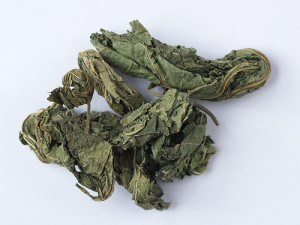
Folium mori albae, also known as Mulberry leaf and Sang Ye in mandarin, is often used as both food and Chinese herb since it is edible and with amazing medicinal properties
Contents
Uses
The bitter, sweet and cold herb has been used in TCM to treat common cold and influenza, dizziness and blurry vision due to liver yang ascending, edema, etc., as it drains Wind, clears Heat and Liver-Heat, improves vision, etc by enhancing the functions of lung and liver channels.
Benefits
1) Controlling blood sugar. It can reduce blood sugar level, which is closely related to its richness in amino acids, fiber, vitamins, minerals and a variety of physiologically active substances (alkaloids and polysaccharides). Among them the total DNA of mulberry can inhibit alpha-glucosidase activity, which thereby inhibits and delay the starch and food from breaking down into glucose and fructose. As a result, it can significantly inhibit the rise in blood sugar after eating.
2) Antibacterial effect. Vitro tests showed that fresh mulberry leaves have a strong inhibitory effect on Staphylococcus aureus, beta-hemolytic bacteria, corynebacterium diphtheria, and Bacillus anthracis. In addition, its plant defensin is anti-microbial.
3) Hypotensive effect. The main active ingredient of anti-hypertension is γ-aminobutyric acid.
4) Reducing lipid. The main active lipid-lowering ingredient is phytosterols.
5) Anti-oxidation and anti-aging effects. The main active ingredient is isoflavones. According to the result of 4-year experiment conducted by the Institute of Clinical Pharmacology in Zhejiang University, it resembles ginseng (Ren Shen) on tonic and anti-aging effects. The difference between them is that ginseng is of warm nature while mulberry leaf is of cold nature.
6) Alleviating menopausal syndrome. It can stabilize autonomic nervous system, which therefore help relieve bad moods of women at the change of life, especially when they get emotional and grumpy.
7) Melasma treatment. It can treat brown to gray-brown patches on the face. Normally 20 days as a course can make spots or pigment fade away gradually.
8) Skin care. Bathing with mulberry leaf decoction helps skin rejuvenation. Or by washing your face it treats facial freckles and dark spots too.
9) Getting rid of acne. As you know, acne is an inflammatory skin disease commonly seen in young people. But you may not know that its decoction or fresh juice is an acne remedy that works.
10) Hair care. It is rich in copper, which make it an herb that can prevent and treat hair graying. When used in combination with black sesame seeds, it can reverse gray hair and prevent premature gray hair and hair loss.
11) Weight loss. Long-term use of mulberry leaf tea can help lose weight. Its diuresis not only promotes urination but also drain away excess water stored in cells. That is the reason why it can reduce inflammation. In addition, it still can empty the excess neutral fat and cholesterol in blood, which actually is also known as blood cleanse. The reason why one is fat is partly because excessive fat storage in abdomen and back. When neutral fat reduces in the blood, stored fat will be thus released and burned in the form of calories. If that cycle repeats body fat will keep decreasing. As you can see, losing weight and lowering blood sugar are somehow interrelated.
12) Relaxing the bowels and reducing the swelling. With the action of mulberry leaves, the saccharide that failed to be absorbed by small intestine will be delivered to the large intestine, where with the help of the intestinal microflora it will be broken down into carbon dioxide, hydrogen, butyric acid, propionic acid, acetic acid, lactic acid and other organic acids. As a result, the acidic environment is formed inside and outside of the intestines. As you know, acid can inhibit the proliferation of harmful bacteria and thus improve constipation and bloating. What’s more, it still can reduce edema by removing excess body water.
Caution
Caution in patients with Yin and blood Deficiency causing spasms or heat.
Interactions
Traditionally not used with Rhizoma Zingiberis Officinalis (gan jiang), Rhizoma et Radix Veratri (li lu), and Rhizoma Dioscoreae Hypoglaucae (bei xie).
Other names
Mulberry leaf and Sang Ye
Reference
Source: Chineseherbshealing, http://www.chineseherbshealing.com/mulberry-leaf/
